Funded by the Stengl-Wyer Endowment, the Stengl Wyer Postdoctoral Scholars Program provides up to three years of independent support for talented postdoctoral researchers in the broad area of the diversity of life and/or organisms in their natural environments. The endowment also supports year-long fellowships for doctoral candidates pursuing dissertation research in the same area.
Read below to learn more about this year's Scholars, Fellows and grant-funded projects. Congratulations to everyone!
2021 STENGL-WYER SCHOLARS
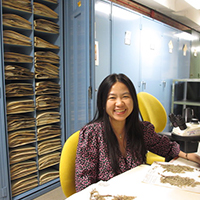 |
LIMING CAILiming Cai is a systematic biologist broadly interested in the study of phylogenetics and evolutionary genomics of plants. Her research integrates fieldwork, herbarium collections, and genomic analysis to characterize the patterns and drivers of biodiversity. Liming completed her Ph.D. at Harvard where her research focused on the whole genome duplication, introgression, and horizontal gene transfer in the diverse plant clade Malpighiales. Her postdoctoral research was at UC Riverside on the functional genomics of gall-inducing aphids. As a Stengl-Wyer Scholar, she will work with Robert Jansen and Justin Havird to investigate the mysterious mitochondrial genome of parasitic plants. |
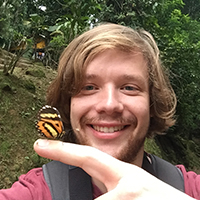 |
HARRY SIVITERHarry Siviter conducted his Ph.D. research at Royal Holloway, University of London, UK, where he studied the impact of novel insecticides on bumblebees. He joined UT as a post-doctoral researcher in 2020 in the lab of Felicity Muth. As a Stengl-Wyer Scholar in the labs of both Muth and Shalene Jha, he will study the impact of multiple environmental stressors on Texas bees, in an effort to understand the drivers of bee declines. |
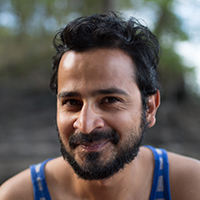 |
UMMAT SOMJEEUmmat Somjee studies the evolution of exaggerated sexually selected traits in animals. Ornamented feathers in birds, deer antlers, elephant tusks, and beetle horns are all examples of sexually selected traits. These traits can be large and are very diverse, yet take all take energy to grow and maintain. His research aims to understand how the energetic costs underlying these exaggerated traits may shape their evolution. Ummat is currently a postdoctoral fellow at the Smithsonian Tropical Research Institute in Panamá. As a Stengl-Wyer Scholar, his faculty mentors are Justin Havird and Mike Ryan. |
2021 STENGL-WYER FELLOWS
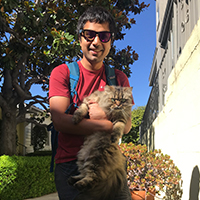 |
NIKUNJ GOELNikunj Goel is a theoretical biogeographer working in lab of Tim Keitt at the Department of Integrative Biology. He is broadly interested in understanding how dispersal generates and maintains biodiversity. As a Stengl-Wyer Fellow, he is building mathematical and statistical theory to understand how human dispersal pathways facilitate the spread of zebra mussels in the inland USA by commercial shipping network. Obviously, he is very fond of cats. |
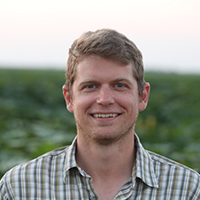 |
NICHOLAS IVERSNicholas Ivers is a Ph.D. candidate in the lab of Shalene Jha where they work on bee conservation amid the threats of rapid habitat loss and rampant infectious diseases. Currently, he is working in pumpkin agroecosystems, applying landscape epidemiology to see how land use impacts bee community diversity, and how the foraging behavior of different species not only determines their effectiveness as pollinators, but also their risk of contracting infectious diseases. |
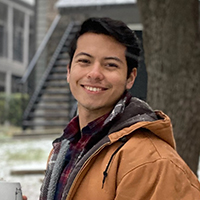 |
DAVID LEDESMADavid Ledesma studies the responses of herpetofauna (non-avian reptiles and amphibians) to environmental changes by studying the fossil remains of herpetofauna from Central Texas. As a Stengl-Wyer Fellow, he and his advisor, Melissa Kemp, will investigate the long-term responses of herpetofauna over the last 21,000 years using a multipronged and integrative approach by examining both morphological and paleogenomic (ancient DNA) data. This will provide a better understanding of the past diversity of herpetofauna in central Texas and the responses of herpetofauna communities during times of considerable environmental change, thus providing an important long-term perspective to inform present-day conservation strategies. |
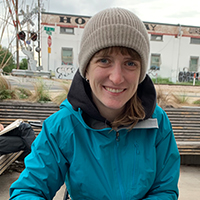 |
JULIE PERREAUJulie Perreau is a sixth year graduate student co-advised by Nancy Moran and Jeffrey Barrick. She is passionate about evolutionary biology, synthetic biology, and microbiology. In her Ph.D. research, she studies how pathogenic bacteria evolve to symbiosis with insect hosts, as well as how bacteria evolve under the constraints of intracellularity and vertical transmission. |
2021 STENGL-WYER GRANT AWARDEES
Research-driven enhancements of field stations
1. Brian Sedio: "Leveraging big data science for ecological research in an era of global change: A Forest Global Earth Observatory (ForestGEO) plot at Stengl Lost Pines Biological Station" (Co-investigators: Eric Abelson, Amy Wolf, Caroline Farrior, Timothy Keitt, Robert Plowes)
2. Robert Plowes: "Establishment of an Experimental Garden and Associated Infrastructure at Stengl Lost Pines Biological Station" (Co-investigator: Larry Gilbert)
Educational support
1. Timothy Keitt: "Undergraduate Biodiversity Scholars: A proposal for a need-based program to fund undergraduate students to take field classes at UT Austin" (Co-investigator: Laura Gonzalez-Guzman)
2. Jo-anne Holley: "A CURE for the Biodiversity Crisis: Integrating Biodiversity Research with Education to Increase Diversity, Equity, and Inclusion in Ecology and Evolutionary Biology" (Co-investigators: Kara Rogers, Thomas Devitt)
3. Kasia Dinkeloo: "FRI Bioprospecting ImPRInt (Impact of Plastics on Rhizosphere Interactions)" (Co-investigators: Jenny Brodbelt, Andy Ellington)
4. Becca Young: "EvoDevOmics: a Freshman Research Initiative Stream"
Research grants
1. Kristin Nielsen "Danger Downstream? Investigating indirect mechanisms of urban runoff toxicity using a whole ecosystem approach" (Co-investigators: Vince Palace, Erin Ussery, Kerri Ackerly)
2. Amy Wolf: "Probing the mechanisms of enhanced ecosystem functioning from diversity: resource acquisition, trophic interaction, and phylogenetic diversity within plant communities" (Co-investigators: Caroline Farrior, Shahlene Jha, Brian Sedio)
3. Felicity Muth: "Examining the function of an insect neurohormone found in plants" (Co-investigator: Brian Sedio)


















Comments